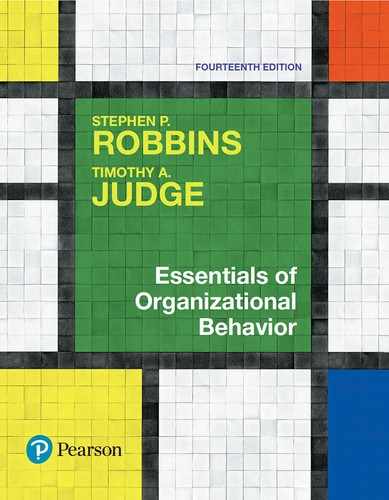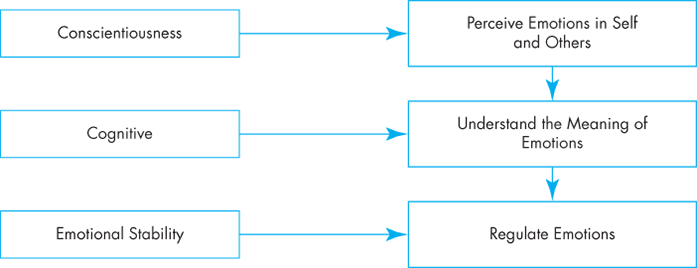 Emotional Intelligence
by Timothy A. Judge, Stephen P Robbins
Essentials of Organizational Behavior, 14/e
Emotional Intelligence
by Timothy A. Judge, Stephen P Robbins
Essentials of Organizational Behavior, 14/e
- Essentials of Organizational Behavior
- Brief Contents
- Contents
- Preface
- About the Authors
- Part 1 Understanding Yourself and Others
- 1 What Is Organizational Behavior?
- Improve Your Grade!
- Learning Objectives
- Management and Organizational Behavior
- Complementing Intuition with Systematic Study
- Disciplines That Contribute to the OB Field
- There are Few Absolutes in OB
- Challenges and Opportunities for OB
- Coming Attractions: Developing An OB Model
- Summary
- Implications for Managers
- 2 Diversity in Organizations
- 3 Attitudes and Job Satisfaction
- 4 Emotions and Moods
- 5 Personality and Values
- 1 What Is Organizational Behavior?
- Part 2 Making and Implementing Decisions
- 6 Perception and Individual Decision Making
- Improve Your Grade!
- Learning Objectives
- What is Perception?
- Person Perception: Making Judgments about Others
- The Link Between Perception and Individual Decision Making
- Decision Making in Organizations
- Influences on Decision Making: Individual Differences and Organizational Constraints
- What About Ethics in Decision Making?
- Creativity, Creative Decision Making, and Innovation in Organizations
- Summary
- Implications for Managers
- 7 Motivation Concepts
- Improve Your Grade!
- Learning Objectives
- Motivation
- Early Theories of Motivation
- Contemporary Theories of Motivation
- Other Contemporary Theories of Motivation
- Job Engagement
- Integrating Contemporary Theories of Motivation
- Summary
- Implications for Managers
- 8 Motivation: From Concepts to Applications
- Improve Your Grade!
- Learning Objectives
- Motivating by Job Design: The Job Characteristics Model (JCM)
- Using Job Redesign to Motivate Employees
- Using Alternative Work Arrangements to Motivate Employees
- Using Employee Involvement and Participation (EIP) to Motivate Employees
- Using Extrinsic Rewards to Motivate Employees
- Using Benefits to Motivate Employees
- Using Intrinsic Rewards to Motivate Employees
- Summary
- Implications for Managers
- 6 Perception and Individual Decision Making
- Part 3 Communicating in Groups and Teams
- 9 Foundations of Group Behavior
- Improve Your Grade!
- Learning Objectives
- Groups and Group Identity
- Stages of Group Development
- Group Property 1: Roles
- Group Property 2: Norms
- Group Property 3: Status, and Group Property 4: Size
- Group Property 5: Cohesiveness, and Group Property 6: Diversity
- Group Decision Making
- Summary
- Implications for Managers
- 10 Understanding Work Teams
- Improve Your Grade!
- Learning Objectives
- Why have Teams become so Popular?
- Differences between Groups and Teams
- Types of Teams
- Creating Effective Teams
- Turning Individuals into Team Players
- Beware! Teams Aren’t Always the Answer
- Summary
- Implications for Managers
- 11 Communication
- 9 Foundations of Group Behavior
- Part 4 Negotiating Power and Politics
- 12 Leadership
- Improve Your Grade!
- Learning Objectives
- Trait Theories of Leadership
- Behavioral Theories
- Contingency Theories
- Contemporary Theories of Leadership
- Responsible Leadership
- Positive Leadership
- Challenges to our Understanding of Leadership
- Summary
- Implications for Managers
- 13 Power and Politics
- Improve Your Grade!
- Learning Objectives
- Power and Leadership
- Bases of Power
- Dependence: The Key to Power
- Power Tactics
- How Power Affects People
- Politics: Power in Action
- Causes and Consequences of Political Behavior
- Summary
- Implications for Managers
- 14 Conflict and Negotiation
- Improve Your Grade!
- Learning Objectives
- A Definition of Conflict
- The Conflict Process
- Negotiation
- The Negotiation Process
- Individual Differences in Negotiation Effectiveness
- Negotiating in a Social Context
- Third-Party Negotiations
- Summary
- Implications for Managers
- 12 Leadership
- Part 5 Leading, Understanding, and Transforming the Organization System
- 15 Foundations of Organization Structure
- Improve Your Grade!
- Learning Objectives
- What is Organizational Structure?
- Common Organizational Frameworks and Structures
- Alternate Design Options
- The Leaner Organization: Downsizing
- Why Do Structures Differ?
- Organizational Designs and Employee Behavior
- Summary
- Implications for Managers
- 16 Organizational Culture
- Improve Your Grade!
- Learning Objectives
- What is Organizational Culture?
- What do Cultures do?
- Creating and Sustaining Culture
- How Employees Learn Culture
- Influencing an Organizational Culture
- The Global Context
- Summary
- Implications for Managers
- 17 Organizational Change and Stress Management
- 15 Foundations of Organization Structure
- Epilogue
- Endnotes
- Glossary
- Index
Emotional Intelligence
As the CEO of an international talent company, Terrie Upshur-Lupberger was at a career pinnacle. So why was she resentful and unhappy? A close friend observed, “Terrie, you were out on the skinny branch—you know, the one that breaks easily in a strong wind. You were so busy and overwhelmed and out of touch with your own values, cares, and guiding beliefs that you failed to pay attention to the branch that was about to break.”57 According to Upshur-Lupberger, she had failed to notice that her moods constantly swung toward frustration and exhaustion. Her job satisfaction, productivity, relationships, and results suffered. Worst, she was too busy to realize the deficiencies until she was completely depleted. She said, “I learned that, as a leader, you either pay attention to and manage the moods (including your own) in the organization, or . . . . you ignore them and pay the price.”58 Upshur-Lupberger learned the value of emotional intelligence.
Emotional intelligence (EI) is a person’s ability to: (1) perceive emotions in him or herself and others; (2) understand the meaning of these emotions; and (3) regulate his or her own emotions accordingly, as shown in Exhibit 4-4. People who know their own emotions and are good at reading emotional cues—for instance, knowing why they’re angry and how to express themselves without violating norms—are most likely to have high EI.59

Exhibit 4-4
A Cascading Model of Emotional Intelligence
Several studies suggest EI plays an important role in job performance. One study that used functional magnetic resonance imaging (fMRI) technology found that executive MBA students who performed best on a strategic decision-making task were more likely to incorporate emotion centers of the brain into their choice processes.60 One simulation study showed that students who were good at identifying and distinguishing among their own feelings were able to make more profitable investment decisions.61
Although organizational behavior (OB) is progressing in its understanding of EI, and several studies suggest it plays an important role in job performance, many questions remain unanswered. One relates to proving what EI may predict. For example, while evidence indicates that EI correlates with job performance, the correlation isn’t high and is explained to a large degree by traits such as emotional stability. A second question is about the reliability of EI testing. For example, part of the reason EI has only a modest correlation with job effectiveness is that it is hard to measure—mostly it is measured with self-report inventories, which of course are often far from objective!
All questions aside, EI is wildly popular among consulting firms and in the popular press, and it has accumulated some support in the research literature. Love it or hate it, one thing is for sure—EI is here to stay. So might be our next topic—emotion regulation—an independent concept from emotional labor and emotional intelligence, although they are related.62
-
No Comment